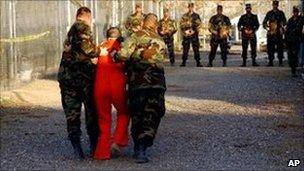Foreign Office officials 'backed Guantanamo detentions'
- Published

Guantanamo Bay opened as a detention facility in 2002
Foreign Office officials supported sending British terrorism suspects to Guantanamo Bay, according to documents disclosed in the High Court.
The material reveals they suggested the US facility would be the "best way" to deal with suspects held in Afghanistan in the immediate wake of 9/11.
The documents have emerged as part of a legal action by six men.
They claim the UK government, including MI5 and MI6, failed to stop their detention or were complicit in it.
The court has also heard claims that former Prime Minister Tony Blair's office frustrated attempts by consular officials to help a detainee who was facing transfer to Guantanamo, the US detention facility in Cuba.
At least 60 government lawyers and officials are now working on the case, which could run for years. They are working in a secure location, sifting through 500,000 sensitive documents, many handed over by MI5 and MI6.
In a hearing on Tuesday, the High Court heard that one document already disclosed to the men indicated that the Foreign Office had supported sending British suspects to Guantanamo.
The memo was written on the eve of Guantanamo's opening in January 2002 - four months after the 9/11 attacks - as security chiefs debated what to do with British men arrested in Afghanistan as suspected supporters of al-Qaeda.
Security objectives
The document said that Guantanamo Bay was "the best way to meet our counter-terrorism objectives". The alternatives, it said, included British forces holding the men in Afghanistan, or repatriating them to the UK.
Days later, US forces delivered the first al-Qaeda suspects to Guantanamo. Within weeks, at least three British men had been imprisoned there.
Tim Otty QC, for the former detainees, told the court that an additional document, also just disclosed, raised questions about Downing Street's involvement in the case of Martin Mubanga, one of the men suing various arms of the government.
Mr Mubanga was arrested in Zambia in 2002 before being taken by US forces to Guantanamo Bay, where he was held for three years.
Mr Otty said: "The PM's office is apparently countermanding a desire of the Foreign and Commonwealth Office to intervene on behalf of Mr Mubanga in circumstances where it could have led to his release."
Last week Prime Minister David Cameron appealed to the six former detainees to enter mediation talks, rather than drag the case through the courts.
That offer came as part of his announcement to the House of Commons of a judge-led inquiry into allegations of complicity in torture and extraordinary rendition.
The government has now formally asked the High Court to suspend the men's legal action, saying they hoped the six would enter talks by mid-October.
But lawyers for the men - Bisher al-Rawi, Jamil el Banna, Richard Belmar, Omar Deghayes, Binyam Mohamed and Mr Mubanga - say they will resist settlement talks until they discover more of what the government knew.